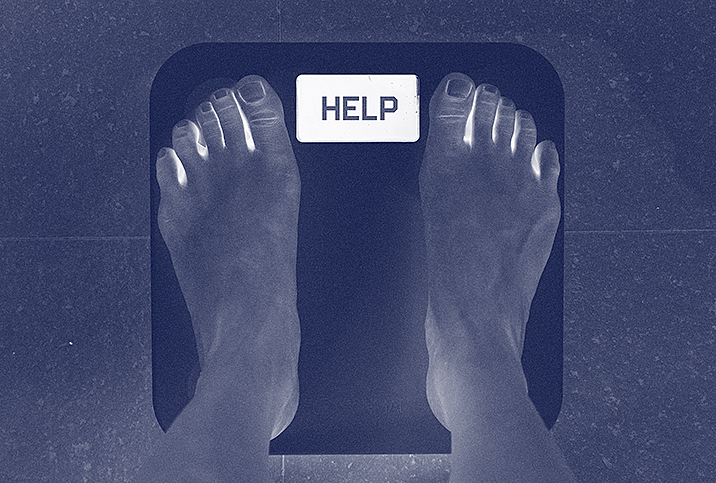Get to Know the Mental Health Impacts of Food Trauma

Certain mental conditions resemble a constellation of overlapping circles in a confusing Venn diagram as opposed to being separated into freestanding, distinct categories. Stressors can lead to an echo chamber of mental health concerns, where trauma and resulting issues coexist and amplify one another.
This is true of trauma, including food trauma, and eating disorders.
Overlap and differences
While the relationship may seem arbitrary, nutritionist Ramona D. Lehadus explained why the link with food and trauma, in particular, is so direct.
"[Post-traumatic stress disorder (PTSD)] is a mental disorder caused by exposure to traumatic events," Lehadus said. "Because PTSD puts our bodies in fight-or-flight mode, appetite is suppressed. Because the body is focusing all its energy and focus on survival, digestion is unnecessary. The body knows we can survive weeks without food, so the priority is to survive."
It's possible, then, that the restriction of food may develop as a reaction to the release of the adrenaline and fear associated with a PTSD-inducing incident.
'Any form of dieting is trauma to the body and brain and can cause a disordered relationship with one's body and food for years or a lifetime.'
On a more conscious level, restricting the food we consume can be a way of exerting control over a situation that's otherwise chaotic. That being said, a mental condition is not a prerequisite for food trauma, said Paula D. Atkinson, an eating disorders therapist and professor at George Washington University.
"Food trauma is most commonly the result of dieting, especially at a young age," Atkinson said. "The body only knows that it is starving, and starvation equals trauma. Food trauma can also come from food scarcity that is not due to dieting or the pursuit of weight loss. But any starvation is trauma to the body and brain. People don't realize that any form of dieting is trauma to the body and brain, and can cause a disordered relationship with one's body and food for years or a lifetime."
However, it's important to distinguish that the trauma from food deprivation, like any trauma, does not automatically trigger a case of PTSD. Of the estimated 70 percent of U.S. adults who experience trauma, only around 20 percent will go on to develop PTSD, a syndrome that has much more narrowly defined symptoms and criteria than the burdens associated with trauma.
Diet culture and food trauma
Many common incidents of food trauma stem from a single, unpleasant experience, such as finding a bug in produce or biting into rotten food. But, Atkinson said, diet culture is its own form of trauma, and isn't limited to one ruined lunch but rather an atmosphere an individual lives in daily.
While both are painful, it's far more difficult to question the unhealthiness of an entire environment than to know you're justified in being disgusted by a hair in your meal. Consider how many pre-teens have been pressured into dieting or feel dieting is necessary to "fix" their growing bodies, and it becomes obvious how intimately intertwined culture and trauma can be.
Food trauma in childhood can manifest long-term.
"Food trauma is either related to the process of feeding—for example, when babies or children are repeatedly forced to eat, they can develop trauma and abhor mealtimes regardless of the food type—or it's related to a specific type or category of foods. For example, people who avoid eating fish or eggs because they had a traumatic event in the past where they got very sick and now they associate that food with being unwell," Lehadus said. "Eating disorders are a type of self-inflicted food trauma that can lead to PTSD."
It's unclear whether experiencing an eating disorder is a common or even probable cause of PTSD, but what is clear is a more general relationship between the two. While not abundant, research does show that people with PTSD are more likely than the general public to have an eating disorder, specifically eating disorders involving bingeing and purging behaviors. In women with lifetime PTSD, 37 percent to 40 percent had bulimia; in men with the same diagnosis, the prevalence of bulimia jumps to 66 percent.
From physical to mental
Mental conditions are often derided and trivialized by those who haven't experienced the illness firsthand. Often, the empathy to recognize an invisible illness requires some level of self-awareness or experience living with the symptoms of a similar situation. Otherwise, it's easy for people to revert to toxic platitudes, like:
- Why does my relative struggle with anorexia when she looks perfectly fine to me?
- Why won't my overweight coworker just eat less and do something about her weight?
Of course, these trivializations only increase the pressure the sufferer may be feeling and the power the psychological disease has over them.
'Because food is a necessary part of our existence and we cannot live or thrive for long periods without food, food trauma and eating disorders are some of the hardest conditions to treat.'
"People don't understand that eating disorders are real diseases, and they are often caused by some sort of trauma, which in turn leads to food trauma and PTSD," Lehadus said. "Eating disorders and trauma go hand in hand, having a double relationship of causality, each causing the other and in reverse. Because food is a necessary part of our existence and we cannot live or thrive for long periods without food, food trauma and eating disorders are some of the hardest conditions to treat.
"People with food-specific trauma live their entire lives avoiding a type or category of food. However, people with eating disorders cannot have a long healthy life, as eating disorders are life-threatening in the short term."
Food trauma, PTSD and eating disorders—no matter what order they emerge in or what is a reaction to what—require the aid and expertise of a nutritionist and a therapist.
Disordered eating is mostly publicly associated with women because the cultural pressure on female body shape is more readily apparent in media. But eating disorders are equally dangerous for whichever sex or shape of the body they inhabit. In fact, the National Eating Disorders Association estimates at least a quarter, and up to 40 percent, of people with eating disorders are male.
No one in any demographic is immune from the possibility of food trauma, and even the most well-intentioned dismissal of this outcome only compounds the issue. Ignoring the illness will inevitably make it worse.
If you or anyone you know is experiencing separate or overlapping traumas, talk to your doctor and find out what your next steps should be to begin the recovery process.




















